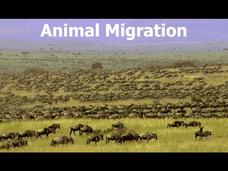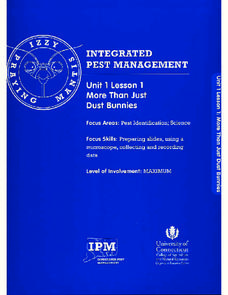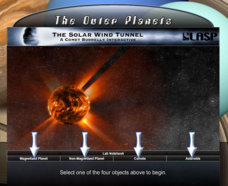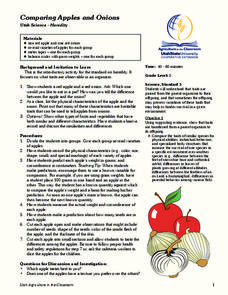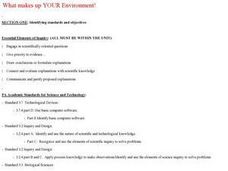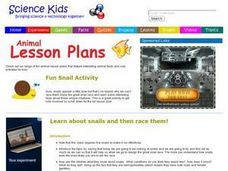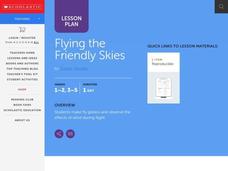Pingry School
Effect of Solutes on Boiling Point
Anyone that lives around snow knows that adding salts to water increases its melting point. Are there solutes that affect the boiling point as well? A scientific experiment has learners add different solutes to water and then...
Nuffield Foundation
Investigating the Effect of Concentration of Blackcurrant Squash on Osmosis in Chipped Potatoes
Model and explore osmosis using squash and potatoes. Young scientists expose chunks of potatoes to different concentrations of a squash solution. They compare the weights of the chunks before and after exposure to the solution and use...
University of Washington
Animal Migration
Here is a unique resource to use with middle and high schoolers that deals with animal migration. Viewers discover the reasons for, types of, and animals that practice this behavioral adaptation. Specific animals that are introduced...
University of Connecticut
More Than Just Dust Bunnies
Teenagers will never complain about cleaning their rooms after this activity. In the first lesson of a four-part series, budding scientists collect samples of dust, chalk, and other particulates from various areas of the classroom....
Laboratory for Atmospheric and Space Physics
The Solar Wind Tunnel
The winds of change are blowing in our very own solar system! But what makes some heavenly bodies more affected by solar winds than others? Pupils discover the concept of magnetic forces at work in space in this...
CK-12 Foundation
Testing Hypotheses: Einstein
Einstein once said "A person who never made a mistake never tried anything new." Enlist his help in teaching young learners the importance of looking for mistakes in hypotheses. An interactive coaches pupils in the falsifiability of...
Curated OER
Physical Changes and the Water Cycle - Three
Third graders observe and reproduce the water cycle in their very own classroom. A simple, yet very effective, demonstration on how water evaporates is observed by the young scientists. They make observations and sketches in their...
Curated OER
I Wonder Why There Is So Much Frass...
Students examine frass and try to determine what it is. They make observations and add to their growth charts on a daily basis. They make predictions and support them to end the activity.
Curated OER
Time-Lapsed Observations
Learners explore timed observations for science investigations. They record ideas on a chart related to a classroom closed terrarium. They repeat their observations for several days and time observations for changing shadows during the...
Curated OER
The Effects of Photosynthesis on Plant Growth
Students examine the process of photosynthesis; its products and reactants, and the sequence of the process. They diagram the light reactions, record observations of plants, and discuss how difficult it is to measure plant growth as it...
Curated OER
Observation And Listening Skills
First graders read a story about polar bears and make observations as they read. In this observations lesson plan, 1st graders listen carefully and sing a bear chant.
Curated OER
I Wonder Where The Manduca Came From...
Students examine how the Manduca came to America the economic means that made it possible. They discover what frass is and make observations. They make their own speculations on why the Manduca came to America.
Curated OER
Observing Reactions
Students use the scientific method to complete to experiments that have visible reactions. In this visible reaction instructional activity, students participate in an experiment with melting ice and one with inflating a balloon. Students...
Curated OER
Observing and Sketching the Lunar Surface
Students explore space science by conducting an illustration activity. In this lunar lesson, students discuss what the moon is and the role it plays for our environment on Earth. Students view images of the moon and utilize chalk to...
Curated OER
Twinkle, Twinkle, Little Star
Learners identify patterns in the stars. In this constellation lesson plan, students simulate constellations using black canisters and patterns. Learners discuss the points on the constellations and how to draw imaginary lines to see the...
Curated OER
Comparing Apples and Onions
Fifth graders observe and compare apples. In this apples lesson, 5th graders work in groups to record the physical characteristics of a variety of apples. Students predict each apples weight and then weigh them to see if they were...
Curated OER
Sink or Float?
Students make and test predictions about sinking and floating, and classify objects according to whether they sink or float.
Curated OER
What is Science?
Students explore physical science by conducting a plant experiment. In this scientific method instructional activity, students discuss questions scientists ask in order to properly explore certain subjects. Students utilize two plants...
Curated OER
What makes up YOUR Environment!
Students create their own land or water environment. They make their environment livable for all the different animals they collect to put in it. Students research the types of animals that they can have in their environment, and how...
Curated OER
Scientific Thinking
Students participate in four different activities which reinforce an understanding of they way scientists think about the world. They make careful observations of two different pennies, write the procedure for making a peanut butter and...
Curated OER
What's the Weather?
Second graders make daily weather observations, record them with appropriate stickers on a chart, and then summarize them at the end of the week in the form of a bar graph.
Curated OER
Learn about snails and then race them!
Students examine snails and make observations about where their eyes are located, how they eat, and how they move. For this snails lesson, students discover information about snails by observing them. Students use magnifying glass, a...
Curated OER
Flying The Friendly Skies
Students investigate the science of flight while creating their own gliders and test them with the lift supplied by wind in the outdoors. They create a chart to make observations of the flight patterns of different gliders taking note of...
Curated OER
The Milk Bottle Quiz
In this scientific statements worksheet, students identify statements as an observation, inference, question, prediction, or factual. This worksheet has 7 matching questions.




